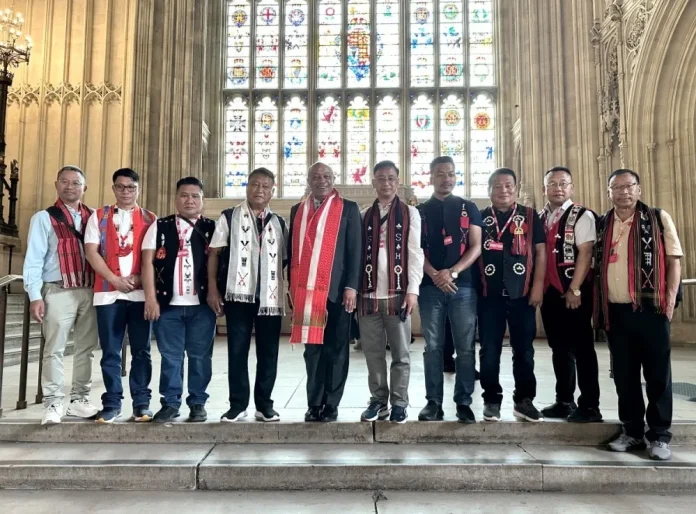DIMAPUR, June 14: In a significant step toward addressing historical injustices, a delegation of Naga tribal hohos was received at the House of Lords in London on June 10, as part of an ongoing effort to secure the repatriation of ancestral human remains held in the United Kingdom.
The delegation met with Rt Hon. the Lord Boateng of Akyem and Wembley, a member of the British House of Lords, who voiced strong support for Indigenous peoples striving to reclaim their ancestral heritage. The visit forms part of a larger global movement focused on restoring dignity to Indigenous communities impacted by colonial-era exploitation.
The high-level engagement follows widespread condemnation in October 2024 of a proposed sale of human remains—including those identified as of Naga origin—by an Oxfordshire auction house. Lord Boateng, alongside Baroness Black of Strome, was instrumental in launching a parliamentary debate that ultimately led to the suspension of the auction and further discussions on legal protections against such sales.
“No human remains should be treated as possessions, curiosity, or for profit. It is morally wrong and offensive,” Lord Boateng told the visiting delegation.
The Naga leaders are currently in the UK to collaborate with the Pitt Rivers Museum, which houses many of the ancestral remains. During their meeting, they thanked Lord Boateng for championing legislative reforms aimed at protecting the dignity of human remains and reinforcing ethical museum practices.
Reflecting on his Ghanaian heritage, Lord Boateng drew a powerful connection between Ghana and India’s shared colonial past, underscoring the importance of truth, justice, and reconciliation for former colonies. “Parliament was the site, on the one hand, where Indigenous lands were taken. On the other hand, Parliament was also the site where acts of independence were signed,” he said. While political freedom has been achieved, he noted, true justice remains elusive for many.
As a gesture of solidarity, Lord Boateng presented the Naga delegation with an official copy of the parliamentary debate proceedings on the issue. He reaffirmed his commitment to supporting the global Indigenous movement. “I salute your struggles to give voice to all Indigenous Peoples because this process represents the Indigenous peoples of the world. We are one people and all of us are deserving of respect,” he said.
Representing the Naga delegation, Thejao Vihienuo, President of the Angami Public Organisation, expressed deep appreciation for the support received and reiterated the mission’s importance in correcting colonial-era wrongs, particularly the removal of ancestral remains.
Ngongba Tange Thamlong Phom, Vice President of the Phom Peoples’ Organisation, emphasized the deep spiritual significance of the repatriation. “There are many ancestors belonging to our people, and the spirits will not find rest and peace until we bring them home,” he said.
Echoing this sentiment, Rev. Aching Peihwang Wangsa of the Konyak Union stressed the emotional impact of witnessing and recovering remains that were taken away generations ago.
Dr. P Ngully, an elder from the Forum for Naga Reconciliation, described the visit as a spiritual pilgrimage. “We have been called to this place by our ancestors who were cared for by the Pitt Rivers Museum,” he said. “We are here to reconcile and bring healing not only to the Naga lands, but to humanity.”

